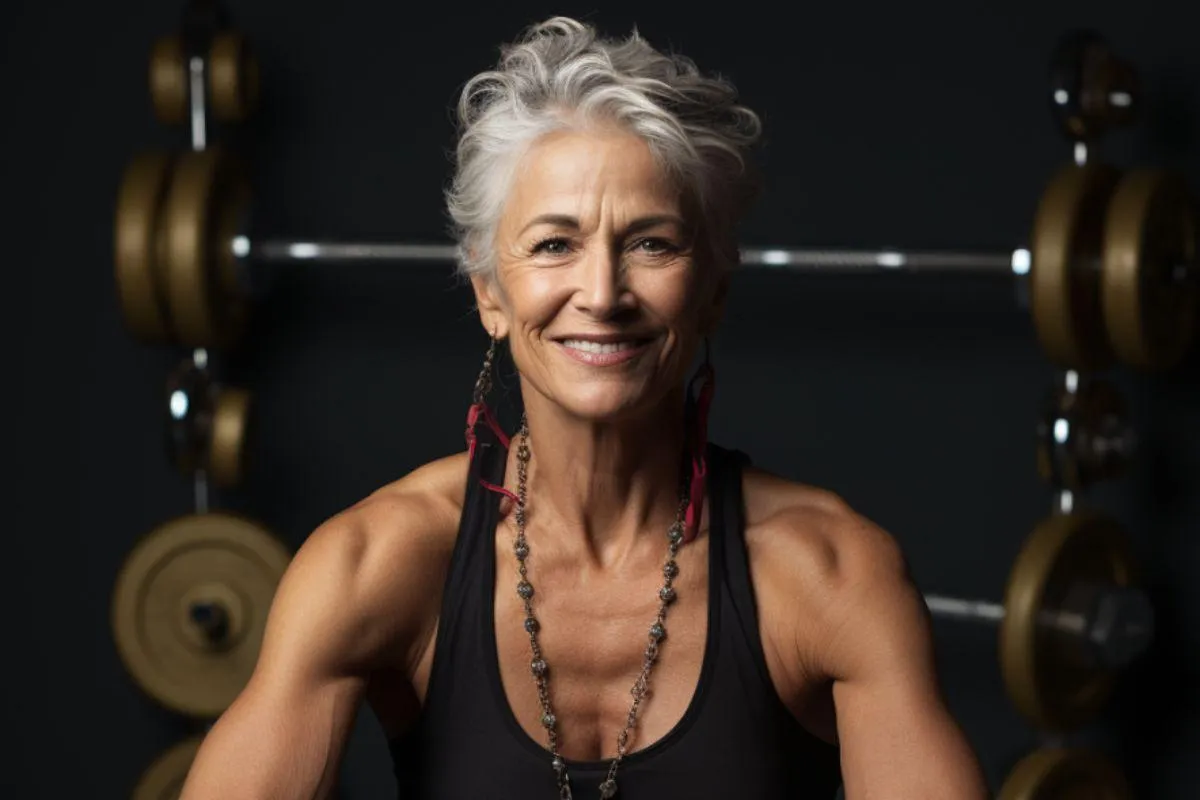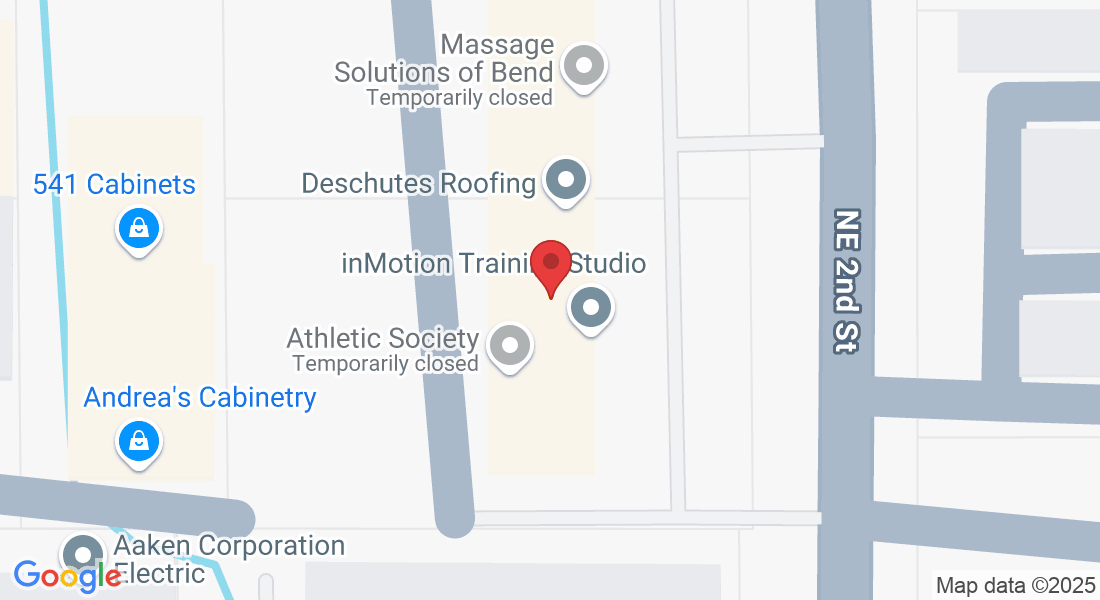blog | inmotion training studio

The Benefits of Creatine: Preserving Muscle Mass & Strength as You Age
Creatine
Creatine is a naturally occurring substance found in your muscle cells that helps them produce energy during high-intensity exercise and heavy lifting. Women’s muscle creatine stores tend to be 70 to 80 percent lower than men’s, and if you're vegan, vegetarian, or don’t eat much meat, your stores are likely even lower.
Creatine? I thought that was just for bodybuilders and weightlifters! Nope!
It is, in fact, IDEAL for older adults.
The body uses this naturally occurring compound to fuel the phosphagen system, which powers short, high-intensity activities that are essential to maintain your muscles as you age.
Now, it’s worth noting that on its own, creatine promotes increased muscle size and strength.
HOWEVER, both creatine and HMB also work even better when they’re together!
Each ingredient works through different mechanisms in the body to benefit muscle size and strength, and the combination of both produce greater results than either alone.
In short, creatine improves body composition, improves muscle performance and capacity, which is also important for muscle growth.
However, the challenge with creatine is that its primary sources are protein-rich foods that older adults tend to eat less of, such as meat and fish (you’d have to eat one pound of red meat daily to get 1,500 mg of creatine). Plus, research shows that older adults have lower levels of the enzyme that makes creatine.
Here, again, supplementing with the right type and levels of creatine is so important!
First What is Creatine
Creatine, first and foremost, is a naturally occurring compound. The body synthesizes it from three amino acids—methionine, glycine, and arginine and uses it to help produce energy in the form of adenosine triphosphate.
Creatine is a compound that is synthesized naturally in the body by combining the amino acids glycine, arginine, and methionine. One of the main benefits of creatine stems from its ability to help make ATP, or adenosine triphosphate.
The body’s main source of energy is ATP, which is used for almost every body process, from exercise to just plain breathing. Muscle cells use ATP for energy by removing a phosphate molecule, which turns adenosine triphosphate into diphosphate or ADP. In order for more energy to be created, ADP needs to become ATP again or else fatigue occurs. This is where our trusty friend creatine comes in.
When there is enough creatine in the muscles, it can be converted to phosphocreatine, which is essentially creatine with a phosphate molecule attached. If there is enough phosphocreatine in the muscles, it can “donate” its phosphate molecule to ADP to make it ATP again. This is how creatine supplementation can provide enough energy needed for the muscle cells to delay fatigue and sustain energy levels during exercise.
It would take pages to explain all of the numerous benefits of creatine. However, creatine supplementation is also used for weight gain, to build muscle, improve athletic performance and change body composition. That said, although creatine has long been considered a supplement strictly for bodybuilders, that narrative is beginning to change.
Creatine production declines with age
Your muscles and brain then tap into those energy stores during demanding tasks (like during a workout or a complex mental task.
However, this internal production of creatine declines with age—even starting as early as your 30s. Therefore, your creatine stores likely aren’t saturated, and your energy availability is unoptimized.
This is especially concerning for women, as their creatine stores are about 70-80% lower than men's to begin with.
The easiest way to fill and maintain your body’s creatine stores is with the help of a high-quality supplement. And, creatine is truly one of the most studied (and well-tolerated) supplements out there.
Benefits Of Creatine For Women
As mentioned, creatine is a dietary supplement that women can and should benefit from if they are seeking physical improvements through strength training. Considering men have naturally high testosterone levels that make building lean body mass a breeze, you may even argue that women are even more incentivized to take creatine to increase muscle mass and boost exercise performance.
BENEFITS:
. Muscle Mass and Strength
Preservation of Muscle Mass: As people age, they naturally lose muscle mass (sarcopenia). Creatine helps maintain and even increase muscle mass, which is crucial for overall strength and mobility.
Strength Gains: Enhanced muscle strength can help with daily activities and reduce the risk of falls and injuries.
2. Bone Health
Bone Density: There is evidence that creatine can support bone health by improving muscle strength and increasing the forces exerted on bones during exercise, which can stimulate bone growth and density.
3. Energy Production
Increased ATP Production: Creatine helps in the production of ATP (adenosine triphosphate), the primary energy carrier in cells. This can enhance overall energy levels and improve exercise capacity, which is especially beneficial for older adults looking to stay active.
4. Brain Health
Cognitive Function: Some studies suggest that creatine can improve cognitive functions, including memory and intelligence, by increasing the energy supply to brain cells. This is particularly important as cognitive decline is a common issue with aging.
5. Menopause Support
Post-Menopausal Women: For women over 40, especially those who are post-menopausal, maintaining muscle mass and bone density is crucial. The decline in estrogen levels during menopause can accelerate bone loss and muscle deterioration, making creatine supplementation beneficial.
6. Recovery and Reduced Fatigue
Improved Recovery: Creatine has been shown to reduce muscle damage and inflammation following exercise, aiding in quicker recovery.
Reduced Fatigue: It can help reduce fatigue and tiredness, which are common issues as people age, thereby improving overall quality of life.
Muscle Recovery- Muscle cells convert ATP, or adenosine triphosphate, into energy by using creatine, which helps muscles recover from exercise quicker and feel less sore during the recovery period. As a result, you will be able to continue exercising even if your muscles are sore, thereby maintaining your muscle strength and improving your athletic performance.
7. Metabolic Benefits
Metabolic Rate: Maintaining muscle mass helps keep the metabolic rate higher, which can aid in weight management and reduce the risk of metabolic disorders such as diabetes.
Usage and Safety
Dosage: A common dosage for creatine is 3-5 grams per day. It is generally safe for long-term use when taken at recommended dosages.
Consultation: It is always advisable for individuals, especially those with underlying health conditions or those taking other medications, to consult with a healthcare provider before starting any new supplement regimen.
Potential Side Effects Of Creatine
Some people may experience mild stomach discomfort when they begin taking creatine for the first time, but this typically subsides after a few days of consistent supplementation. The biggest effect of creatine supplementation that women should be aware of is its effect on body weight.
Now, don’t be alarmed just yet. Though you may have heard that creatine is often taken for weight gain, this weight is rarely ever fat tissue. The thing is, when creatine levels rise in the muscle cells, it brings a lot of water with it. This swelling via water is a good thing, because it can help increase muscle mass. However, the water retention can be alarming for those who heavily rely on the scale to track their fitness progress.
In fact, it has been shown that people who start supplementing with creatine can expect to gain 2 to 4 pounds weight of water weight during the first couple of days. This water retention caused by creatine supplementation can also cause bloating, which can cause panic in those who aren’t expecting it and may mistake it for fat gain.
The good news is that, if you’re expecting the water retention and bloating, you’ll know that it’ll pass eventually. Other than that, creatine does not appear to have any negative side effects when taken as directed within safe dosages.
The Impact of Aging on Muscle Mass and Strength
One of the most significant threats to quality of life as you age is the loss of muscle mass and strength. This decline, known as "functional capacity," can manifest in various ways:
Difficulty Rising: Getting off the couch becomes a strenuous task.
Increased Stiffness: Post-workout stiffness feels worse than it did a few years ago.
Challenges with Stairs: Climbing stairs starts to feel like an intense workout.
Reduced Activity: Activities you love, such as playing with kids, gardening, walking, jogging, or playing pickleball, become more challenging.
Decreased Energy: Your daily energy levels drop more quickly than they used to.
These signs might appear gradually, but they highlight the importance of maintaining muscle mass and strength.
The Alarming Statistics
Muscle Mass Decline: After age 30, adults lose 3 to 8% of their muscle mass per decade. This rate can jump to 15% per decade after age 60.
Muscle Strength Decline: Muscle strength loss occurs 50% faster than muscle mass loss. For those 50 years old, strength can decline by 1.5 to 5% each year, and this rate increases with age.
What you should look for in a creatine supplement....
Essential Amino Acids (EAAs)
Amino acids are the building blocks of life, essential for making muscles, hormones, neurotransmitters, and other tissues. There are nine essential amino acids (EAAs) that your body cannot produce and must be obtained through diet. Branched chain amino acids (BCAAs), specifically leucine, isoleucine, and valine, are particularly important for muscle metabolism.
Benefits of EAAs
Muscle Protein Synthesis: Leucine promotes muscle protein synthesis, aiding muscle repair and building. Even if protein intake is below the recommended amount, protein high in leucine can stimulate muscle protein synthesis effectively.
Inflammation Reduction: In postmenopausal women, amino acid availability can lower inflammation and help preserve muscle mass and improve lean body mass.
Recommended Intake: The International Society of Sports Nutrition recommends at least 10 to 12 grams of EAAs and 1 to 3 grams of leucine from protein-rich meals and snacks. Older women may need 3 to 4 grams of leucine per meal for optimal muscle protein synthesis stimulation. An amino acid supplement containing BCAAs can help achieve these targets.
HMB (β-hydroxy-β-methylbutyrate)
HMB has a long history in bodybuilding and is gaining popularity among active midlife adults for muscle maintenance. It increases muscle protein synthesis, reduces muscle protein breakdown, and helps preserve muscle health and mass.
Benefits of HMB for Women Over 40
Muscle Preservation: HMB helps maintain muscle mass by promoting muscle protein synthesis and reducing muscle breakdown.
Improved Body Composition: A study on midlife women (average age 53) found that HMB, along with vitamin D3 supplementation, decreased intermuscular fat in resistance training women during a 12-week trial.
By incorporating these supplements, women over 40 can effectively support muscle maintenance, bone health, and overall well-being, particularly through the menopause transition and beyond.
Betaine
Drinking water is important for your muscles, but it’s also a matter of properly enabling your body to draw water into your cells – including the muscle cells.
And this is where betaine comes in, because it’s perhaps most well-known for doing just that -- drawing water into cells and helping them stay properly hydrated!
This hydration is an often-forgotten “golden key” to healthy muscles.
That’s because muscles are controlled by nerves, and if they’re not properly hydrated, it can impact both your muscle strength and control, which in turn can lead to balance problems and more.
Along those lines, supplementing with the right type and amount of betaine is essential to help combat age-related muscle loss.
OK, AWESOME, BUT THAT SOUNDS LIKE A LOT OF SUPPLEMENTS, RIGHT?
You now understand why age-related loss in muscle mass and strength are both among the top reasons for an increasing decline in the quality of life – and why it’s so important to address it now.
You now know why taking HMB and vitamin D together – along with creatine and betaine – may be the ultimate “recipe” of clinically backed nutrients to combat this age-related muscle loss.
However, because it is so hard to get all four of these nutrients from foods, it also sounds like a serious investment in four different types of supplements, right?
Well it used to be, but not anymore…you find all of these together in the New Biotrust Ageless Muscle.
We carry this at the studio which is on sale for $29 or you can order yourself with the link above....
There are many of great brands as well- just be sure to look for Vitamin d for absorption and HMB....
Have any other supplements you are want to know more about? Let me know....
In motion training studio - bend
social media
REQUEST MORE INFORMATION
change you can do & results you will see








